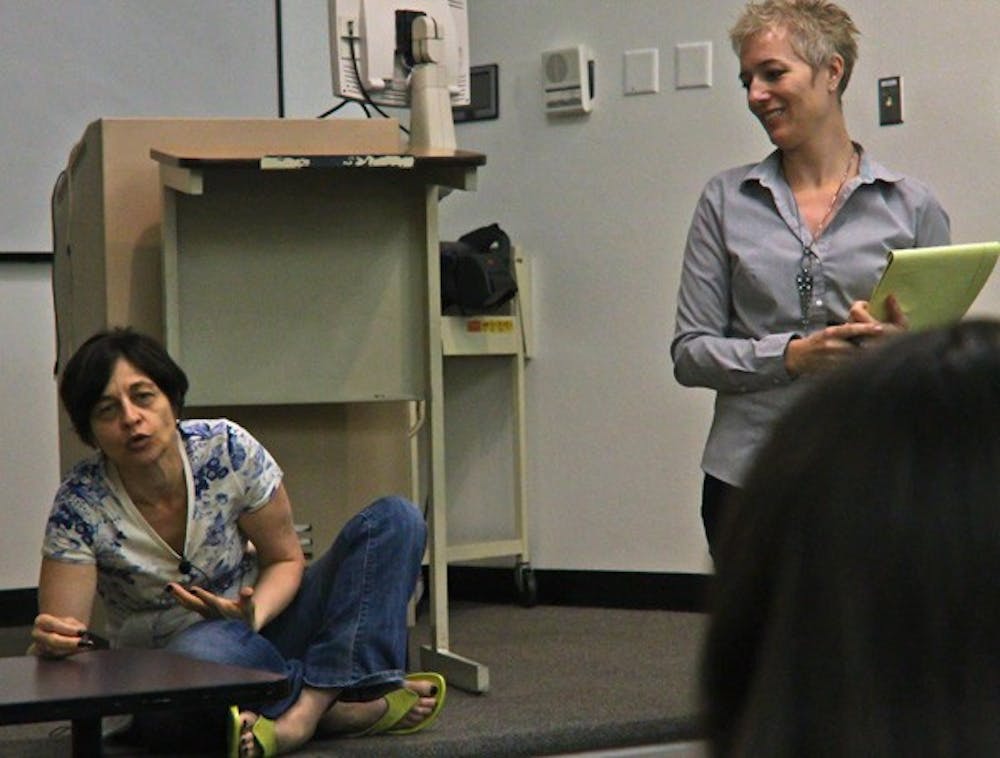 Italian director Marina Spada shared her film, aesthetic and thoughts on differences in cinema today at ASU's School of Letters and Cultures' International Artists Lecture Series April 15. (Photo by Kylie Gumpert)
Italian director Marina Spada shared her film, aesthetic and thoughts on differences in cinema today at ASU's School of Letters and Cultures' International Artists Lecture Series April 15. (Photo by Kylie Gumpert)Italian director Marina Spada shared her film, aesthetic and thoughts on differences in modern cinema Monday at ASU's School of Letters and Cultures International Artists Lecture Series.
“I don’t see your biggest Blockbuster movies,” Italian director Marina Spada said in an artists lecture series Monday evening. “They bore me, and I don’t learn anything from them.”
These are strong words coming from a woman who is self-taught in cinematography, but nonetheless a showing of her film “Il mio domani” ("My Tomorrow") and following Q&A; on April 15 brought together a small gathering of students and professors, making up ASU’s very own “little Italy.”
Spada presented the capstone lecture that opened up the floor for discussion of the difference between European and American film and the roles of women in the industry today.
“Hollywood is not a cultural environment,” Spada said. “Part of it is just the industry where money flows and flows, and Italy is not like that. (In America) It’s an investment. If you invest 100 million dollars in a movie, of course you have to make even more.”
“My Tomorrow,” Spada’s fourth film, is about a businesswoman (played by Italian actress Claudia Gerini) who realizes that her independent life in Milan is a façade and begins to explore herself through photography — which helps her open up to the world around her.
The film was Gerini’s first emotional role. As an actress who has only played comedic characters, Spada said Italian actors like Gerini are expected to stay in their specific character roles and wear a “mask” that restricts the identities they can portray. However, Gerini was nominated for the David di Donatello Awards, which is similar to the American Oscars and has given her more opportunities in film.
“She is now ‘free’ to do other roles because of this,” Spada said.
Italian and creative writing junior Morgan Brownlee came to the event to fulfill a requirement Italian students have to attend cultural events.
“Obviously, our industry is very different from the Italian industry, “ Brownlee said. “It was wonderful and amazing to be able to ask her questions in Italian. As a musician and as a storywriter, I really enjoyed that element of being able to connect and talk with a person of like-mind.”
Some attendees questioned the films overall intention, asking questions about the open-to-interpretation ending and visual shots that sparked a melody of different ideas concerning the meaning behind it all. Spada’s overall response was that it’s simply a different type of cinema, because American films tend to follow a linear narrative that is exterior, predictable and does not always leave space for an emotional element.
As for Spada’s reason for making films like “Il mio domina,” she believes the viewer should find his or her own interpretation because the images she creates are not necessarily arbitrary, and it helps her to learn something about herself.
“That is why I make all of my films, to learn something about myself,” Spada said. “In every film that happens, that is the true motivation, true reason that I am a filmmaker.”
Spada plans to shoot her next film in Milan as well, and it will deal with the topic of finances and the financial market in light of the crisis the country went through.
Reach the reporter at kgumpert@asu.edu or through Twitter @cat2bekittenmee




